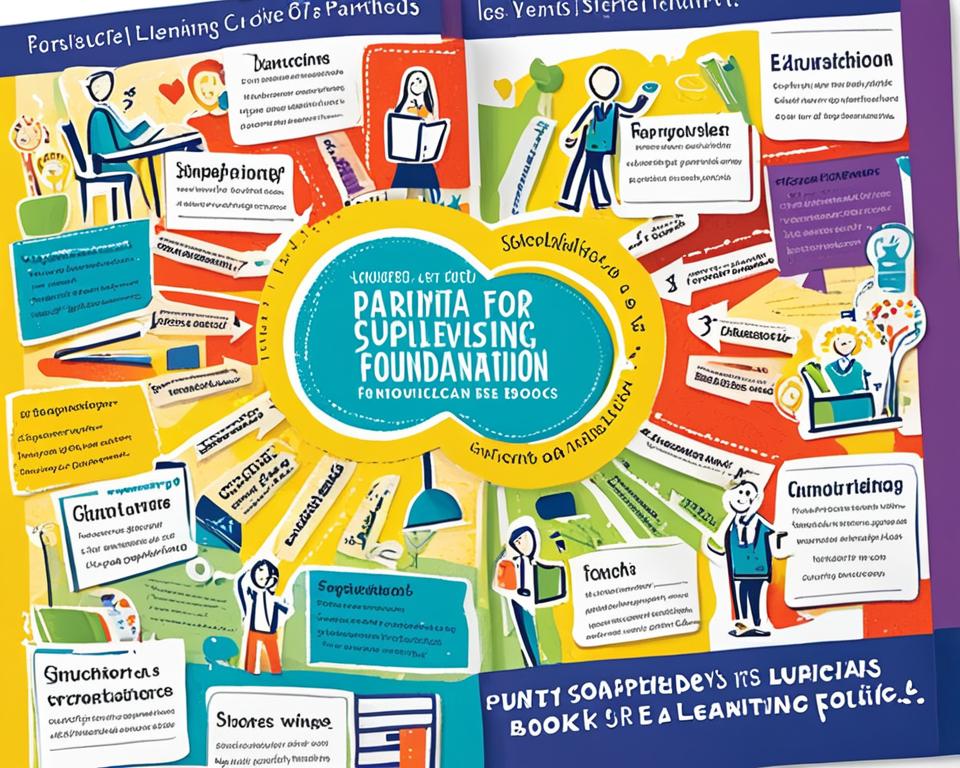Welcome to our article series on empowering parents in education. In this first section, we will explore the importance of parental partnership in building strong foundations for student success. We believe that school-home collaboration and family engagement are key drivers in creating a solid educational base for children. By actively involving parents as key stakeholders in their child’s education, we can make a positive impact on student outcomes.
At [Your Brand], we understand that parents play a crucial role in shaping their child’s educational journey. Research consistently shows that students thrive when their parents are actively engaged in their learning process. Through collaboration between teachers, parents, and students, we can create a supportive environment that fosters academic achievement, social-emotional growth, and overall student success.
As you navigate through this article, we encourage you to explore the various aspects of parental partnership, including the benefits it brings to both students and parents themselves. Discover how school-home collaboration strengthens the educational ecosystem and enhances the learning experience for children. Learn about effective family engagement strategies and communication techniques that foster a strong partnership between home and school.
Join us on this journey of empowering parents in education, as we delve into the vital role they play in building a solid knowledge foundation for their children.
Key Takeaways:
- Parental partnership is crucial in building strong foundations for student success.
- School-home collaboration and family engagement positively impact student outcomes.
- Parents play a key role in shaping their child’s educational journey.
- Active parent involvement fosters academic achievement and social-emotional growth.
- Effective family engagement strategies enhance the learning experience for children.
Understanding ‘In the Moment Planning’ and Parental Impact
Exploring the concept of ‘In the Moment Planning’ and its profound impact on child development can offer valuable insights into the role of parents in shaping their children’s educational journey. This section will delve into the significance of play in fostering cognitive, social, and emotional growth in children, while highlighting the crucial roles parents and teachers play in scaffolding learning and providing guidance.
The Role of Play in Child Development
Play serves as a powerful vehicle for learning and growth in early childhood. It allows children to explore, experiment, and make sense of the world around them. By engaging in imaginative play, interactive games, and spontaneous activities, children develop essential skills such as problem-solving, critical thinking, and creativity. Moreover, play contributes to the development of social and emotional competence, fostering empathy, communication, and self-regulation.
Scaffolding Learning with Parent and Teacher Guidance
Parents and teachers play a pivotal role in scaffolding learning, providing the necessary support and guidance as children navigate new concepts and skills. Through thoughtful questioning, modeling, and encouragement, they assist children in advancing their understanding and abilities. This scaffolding approach promotes meaningful engagement, builds resilience, and nurtures a growth mindset, empowering children to become independent learners.
Facilitating a Language-Rich Environment for Growth
A language-rich environment is vital for fostering holistic development in children. Immersion in a language-rich environment not only enhances language acquisition but also cultivates cognitive abilities, critical thinking, and problem-solving skills. Parents and educators can create an environment rich in vocabulary, meaningful conversations, and exposure to varied forms of literature, sparking curiosity and igniting a lifelong love for learning.
Organizing Classrooms for Independence and Co-learning
Organizing classrooms in a manner that promotes independence and co-learning among students is crucial for their holistic development. The physical layout of the classroom, availability of learning materials, and incorporation of collaborative spaces all contribute to a conducive learning environment. By fostering independence, collaboration, and peer-to-peer interactions, classrooms become vibrant hubs for meaningful exploration and knowledge exchange.
Empowering Parents in Education: Engagement for Student Success
In order to promote student success, it is crucial to empower parents in education and promote their active involvement in school activities. When parents are engaged in their child’s education, it creates a strong partnership between home and school, leading to improved academic outcomes and holistic development. Maximizing parental involvement in schools is key to fostering this partnership and creating a supportive learning environment for students.
Maximizing Parental Involvement in Schools
There are several strategies that schools can implement to maximize parental involvement. By encouraging parents to volunteer in school activities, participate in parent-teacher associations, and attend school events, schools can create opportunities for parents to actively contribute to their child’s educational journey. These involvement opportunities not only allow parents to gain a deeper understanding of their child’s learning environment but also provide avenues for them to collaborate with teachers and administrators.
Additionally, schools can establish effective communication channels to keep parents informed about their child’s progress and school activities. Regular updates, such as newsletters or email communication, can keep parents engaged and aware of important information. Parent-teacher conferences serve as valuable opportunities for meaningful discussions about a child’s academic performance and goals.
Parent-Teacher Communication Strategies
Effective parent-teacher communication is paramount in empowering parents and promoting student success. Schools should consider utilizing various communication strategies to ensure consistent and meaningful dialogue between parents and teachers. Digital communication platforms, such as online portals or messaging apps, can facilitate easy and timely information sharing. These platforms enable parents to stay connected with their child’s learning journey and collaborate with teachers on specific areas of support.
In addition, schools can organize workshops or training sessions to equip parents with knowledge and skills that enhance their ability to support their child’s education. Providing resources and guidance on effective study habits, homework assistance, or subject-specific support can empower parents to make a positive impact on their child’s learning outcomes.
The active involvement of parents in education is instrumental in promoting student success. By maximizing parental involvement in schools and implementing effective parent-teacher communication strategies, schools can create a strong foundation for student growth and achievement. Collaborating with parents creates a synergy between home and school, fostering an environment where students can thrive academically, socially, and emotionally.
Parental Involvement: A Correlation with Academic Achievement
In the pursuit of academic achievement, parental involvement plays a vital role. Research has consistently shown a positive correlation between parental involvement and improved outcomes in a child’s education. When parents actively engage in their child’s learning journey, forging strong family-school relationships, the results are far-reaching and meaningful.
Utilizing Family School Relationships for Improved Outcomes
Achieving academic success is not a solitary endeavor; it requires the collaboration of parents and educators. By fostering strong family-school relationships, we create an environment conducive to holistic development and enhanced academic achievement. When parents actively participate in their child’s education, students benefit from the combined support and guidance offered by both home and school.
Utilizing family-school relationships for improved outcomes involves open communication, cooperation, and a shared vision of the student’s educational journey. By involving parents in decision-making processes and soliciting their input, schools can create a culture of partnership that leads to increased student success.

The Dynamic of Educator Assumptions and Parent Engagement
While parental involvement is crucial, it’s essential to address the dynamic of educator assumptions. Educators sometimes make assumptions about parents’ level of engagement or their ability to contribute meaningfully to their child’s education. These assumptions can unintentionally hinder parent engagement and limit the potential benefits for student achievement.
To overcome these obstacles, educators must approach parental involvement with an open mind and a willingness to collaborate. Establishing regular communication channels, providing opportunities for parent input, and valuing diverse perspectives can help bridge the gap between educators and parents. By challenging assumptions and fostering a culture of respect and partnership, we can maximize the potential of parental involvement in education.
Table: Benefits of Parental Involvement
| Benefits | Description |
|---|---|
| Improved Academic Performance | Higher grades, test scores, and graduation rates |
| Enhanced Social and Emotional Development | Greater self-confidence, social skills, and resilience |
| Positive Attitudes Towards Learning | Increased motivation, engagement, and enthusiasm |
| Effective Study Habits and Time Management | Improved organization, responsibility, and accountability |
| Reduced Behavioral Issues | Decreased disciplinary actions and behavioral challenges |
By recognizing the impact of parental involvement on academic achievement, leveraging family-school relationships, and addressing educator assumptions, we can create a strong foundation for student success. It is through collaboration, understanding, and active engagement that we unlock the full potential of our students while fostering a supportive and nurturing learning environment.
Championing Family Engagement Strategies in Learning
The success of a student’s educational journey is greatly influenced by the involvement of their family. Collaborating with families through effective engagement strategies can significantly enhance learning outcomes. By championing family engagement in education, schools can create a supportive and enriching environment that nurtures student success.
There are various proven approaches and techniques that schools can employ to actively involve families in their child’s education. These strategies promote parental involvement, cultivate a sense of ownership in their child’s learning journey, and reinforce the value of collaboration between home and school. By embracing these family engagement strategies, schools can foster a holistic learning experience for students.
One effective strategy is to establish regular communication channels between teachers and parents. This can be achieved through parent-teacher conferences, digital communication platforms, and newsletters that provide updates on students’ progress and upcoming events. Open and transparent communication builds trust and enhances collaboration between educators and families, fostering a supportive learning environment.
Another powerful strategy is to involve families in the creation of learning opportunities that align with the curriculum. Collaborative projects, such as family-based assignments or community projects, enable parents to actively participate in their child’s education. This engagement not only reinforces the value of learning but also empowers parents to support their child’s academic growth beyond the classroom.
Moreover, schools can organize workshops or seminars that equip parents with practical learning strategies. These sessions can provide insights into effective study habits, homework management techniques, and ways to support specific subject areas. By equipping parents with knowledge and resources, schools empower them to actively contribute to their child’s learning journey.
Family engagement strategies also extend to co-curricular activities and school events. Encouraging family participation in extracurricular programs, such as sports events, music festivals, or science fairs, strengthens the bond between families, schools, and the wider community. These events provide opportunities for parents to witness and celebrate their child’s achievements, reinforcing their commitment to their child’s education.
In conclusion, championing family engagement strategies in learning is vital for student success. By actively involving families in their child’s education, schools create a supportive and collaborative environment that enhances learning outcomes. From effective communication channels to collaborative projects and co-curricular activities, family engagement strategies empower parents to play an active role in their child’s educational journey.
Fostering Parent Advocacy in Education Through Affirmative Action
Parental involvement is crucial for a thriving education system, as engaged parents can significantly impact their child’s educational journey. Fostering parent advocacy in education through affirmative action is an effective approach to ensure parents are active participants in decision-making processes.
Developing Instruments for Measuring Engagement
Measuring parental engagement is an essential step in understanding the depth and effectiveness of parent advocacy in education. By developing instruments that quantitatively and qualitatively assess parent engagement, schools can gain insights into the level of involvement and tailor their strategies accordingly.

Building a Solidarity-Based School Climate Welcoming Family Participation
Cultivating a school climate that embraces family participation is vital for fostering parent advocacy in education. By creating an inclusive and supportive environment that values parent input, schools can promote collaboration between families, educators, and the broader community.
Collaborating with Parents for Academic Achievement
Collaboration between parents and educators plays a crucial role in fostering academic achievement. By working together, parents and schools can create an environment that supports students’ educational journey and maximizes their potential for success.
Importance of Family Input in Educational Strategy
When developing educational strategies, incorporating family input is essential. Parents have unique insights into their child’s strengths, weaknesses, and learning style. By actively involving parents in the decision-making process, schools can tailor their approaches to better meet the individual needs of students.
Family input provides valuable perspectives and helps shape effective educational strategies that consider the holistic development of each student. It ensures that the educational experience is meaningful and relevant to the child’s background, interests, and aspirations. By involving parents in the process, schools can create a partnership that strengthens student engagement and promotes academic achievement.
Communication Systems Between Home and School
A robust communication system between home and school is crucial for effective collaboration. Open lines of communication facilitate the exchange of information, enable timely updates on student progress, and allow for proactive intervention when needed.
Communication systems should be comprehensive, ensuring that parents have access to various channels to connect with teachers and school staff. This can include emails, phone calls, parent-teacher conferences, and digital platforms. By utilizing multiple communication avenues, schools can accommodate the diverse needs and preferences of parents, enabling them to be active participants in their child’s education.
Effective communication systems foster transparency, establish a sense of partnership, and facilitate the flow of information that is vital for student success. They promote proactive collaboration between parents and educators, ensuring that everyone is aligned in supporting the academic and personal growth of each child.
| Benefits of Collaborating with Parents | Impact on Academic Achievement |
|---|---|
| Enhanced parental involvement | Improved motivation and engagement |
| Increased support for learning at home | Higher academic performance |
| Greater understanding of student strengths and challenges | Targeted interventions and personalized learning |
| Strengthened home-school partnership | Cultivation of a positive learning environment |
Table: Benefits of Collaborating with Parents for Academic Achievement
Collaboration with parents is vital for academic achievement. By valuing family input in educational strategy development and ensuring effective communication systems, schools can create a partnership that empowers parents and bolsters student success.
The Evolving Landscape of School-Home Partnership During a Global Crisis
In the face of a global crisis, the education landscape has undergone a significant transformation. As schools around the world shifted to remote learning, the concept of school-home partnership took on a new dimension. Adapting to this new reality, educators and parents have had to navigate uncharted territories to ensure education continuity and remote learning engagement. In this section, we will explore the challenges and opportunities presented by the evolving landscape of school-home partnership during a global crisis, as well as the critical role of parental support in maintaining education continuity.
Adapting to Remote Learning Engagement
The transition to remote learning posed numerous challenges for schools, teachers, and students. In order to facilitate effective remote learning engagement, educators had to quickly adapt instructional strategies and utilize technology to deliver engaging and interactive lessons. Additionally, schools had to provide access to devices and reliable internet connectivity for students who may not have had these resources readily available at home. Despite the obstacles, educators and parents worked together to ensure that students could continue their education from the safety of their own homes.

Recognizing the Importance of Parental Support in Education Continuity
Amidst the global crisis, parental support emerged as a crucial factor in maintaining education continuity. With children learning from home, parents became more involved in their child’s education, taking on the role of both caregiver and learning facilitator. Parents provided the necessary guidance and support to help their children navigate the challenges of remote learning and adjust to the new learning environment. Their active involvement was instrumental in ensuring that education continued despite the disruptions caused by the global crisis.
As the landscape of education continues to evolve, the partnership between schools and parents will play an increasingly important role in student success. By working together, schools and families can overcome the challenges of remote learning and provide a supportive environment for students to thrive. The global crisis has reemphasized the value of school-home partnership and highlighted the need for parental support in maintaining education continuity.
Strengthening Family-School Partnerships for Holistic Development
In order to foster holistic development in students, it is essential to strengthen family-school partnerships. By creating ecosystems that provide enhanced learning opportunities both inside and outside the traditional classroom, we can empower students to reach their full potential.
Creating Ecosystems for Enhanced Learning Opportunities
One way to strengthen family-school partnerships is by creating ecosystems that offer a wide range of learning opportunities. This can be achieved through:
- Collaborative projects: Encouraging families and schools to work together on hands-on projects that promote critical thinking, problem-solving, and creativity.
- Experiential learning: Providing opportunities for students to engage in real-world experiences that integrate academic knowledge with practical skills.
- Community involvement: Partnering with local organizations, businesses, and community members to provide students with access to diverse learning resources.
By leveraging these strategies, we can create a rich and dynamic learning environment that goes beyond the confines of the classroom.
Aligning Visions for Educational Excellence and Community Involvement
To ensure the success of family-school partnerships, it is crucial to align visions for educational excellence and community involvement. This alignment can be achieved through:
- Shared goals and values: Building a shared understanding of the importance of education and the role of families, schools, and the community in supporting student growth.
- Open communication: Establishing clear lines of communication between families and schools to foster mutual understanding, collaboration, and trust.
- Collaborative decision-making: Involving families, schools, and the community in the decision-making process to ensure that the needs and aspirations of all stakeholders are taken into account.
By aligning our visions and working together towards a common goal, we can create a cohesive and supportive educational environment that benefits all students.

Promoting Parent Participation in Education: Techniques and Benefits
Active parent participation in education plays a crucial role in fostering student success and overall school improvement. By actively engaging parents in the educational process, school systems can create a collaborative and supportive environment that enhances student learning and well-being. This section explores techniques and benefits of promoting parent participation in education, highlighting strategies for school systems to better serve students and the cost-effectiveness of direct communication with families.
Strategies for School Systems to Better Serve Students
School systems can implement various strategies to actively involve parents in their child’s education, maximizing the benefits of parent participation. Some effective strategies include:
- Establishing open and welcoming school environments that encourage parental involvement.
- Organizing regular parent-teacher conferences to provide updates on student progress and areas for improvement.
- Offering workshops and training sessions for parents to enhance their understanding of educational techniques and optimize their support at home.
- Creating volunteering opportunities that allow parents to contribute their skills and expertise to the school community.
- Implementing parent engagement programs that promote active participation in decision-making processes, such as parent-teacher associations or advisory committees.
By implementing these strategies, school systems can establish a strong partnership with parents, leading to improved academic outcomes and holistic student development.
The Cost-effectiveness of Direct Communication with Families
Direct communication with families is a cost-effective approach that allows schools to engage parents in a meaningful way. Through direct communication channels such as email, school websites, and mobile applications, schools can effectively share information, updates, and resources with parents. This streamlined communication process minimizes the need for expensive printing and distribution of physical materials. Additionally, direct communication enables parents to stay informed about their child’s academic progress, upcoming events, and opportunities for involvement.
Moreover, direct communication fosters a sense of transparency and trust between schools and parents, strengthening the overall partnership. By leveraging technology and digital platforms, schools can enhance accessibility and ensure that parents have the necessary information to support their child’s education.
Conclusion
Throughout this article, we have explored the vital role of parental partnership as the keystone of knowledge in education. We have highlighted the significance of school-home collaboration and family engagement in building strong foundations for student success. By empowering parents and actively involving them in their child’s education, we can create a solid educational base that nurtures and supports children’s holistic development.
As we conclude, it is important to recognize the future directions for empowering parents in education. Continued efforts should be made to maximize parental involvement in schools, fostering strong family-school relationships for improved outcomes. Effective parent-teacher communication strategies should be embraced, utilizing regular updates, conferences, and digital platforms to ensure a robust partnership between home and school. By championing family engagement strategies and promoting collaboration, we can create an environment that values the input and participation of families, leading to enhanced learning opportunities and educational excellence.
Looking ahead, it is imperative that we continue to strengthen the collaboration between parents and schools. By embracing the interconnectedness of home and education, we can provide a comprehensive and supportive framework for student success. As we embark on this journey, let us remember that parental partnership is not just a cornerstone but also the key to unlocking the full potential of our children’s education.
